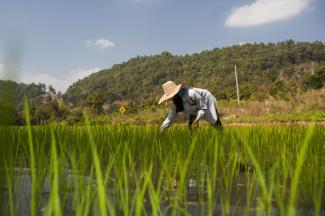Neglected disease
Life-saving rubber boots
 Bleyer/Lineair
Bleyer/Lineair
Mostly found in the country’s north-east, melioidosis is caused by Burkholderia pseudomallei, bacteria that live in soil and water in the world’s tropical regions. One can get infected by drinking water or standing in water. The symptoms are high fever and indistinct pains, which make melioidosis difficult to identify. The disease is often not diagnosed correctly, and many infected people die within 24 hours.
In January 2016, the science journal Nature published a report on melioidosis. It included global data and stated that this disease is severely underreported in the 45 countries in which it is known to be endemic. Moreover, the report showed that melioidosis is likely to be endemic in a further 34 countries where the disease has not been officially reported. Yet it kills around 90,000 people each year. So far, melioidosis is not one of the NTDs that the World Health Organization (WHO) prioritises.
There is a cure for melioidosis, but it is only applied if the disease is properly diagnosed. To administer medication, doctors need to identify the infection fast. The sad truth, however, is that the poor patients who suffer from this disease tend to be just as neglected as the disease itself.
Though melioidosis is the third most dangerous disease in Thailand, it does not get much attention. After all, it mostly affects poor rural workers and people who lack access to clean drinking water. One academic institution does specialise in it as well as other NTDs however: the Mahidol Oxford Tropical Medicine Research Unit (MORU), which is run by Bangkok’s Mahidol University in cooperation with Oxford University in Britain.
Direk Limmathurotsakul heads the microbiology department at the Mahidol Faculty of Tropical Medicine. There is no vaccine, he says, but insists that people can protect themselves from melioidosis “simply by boiling water before drinking it and wearing rubber boots when they work in the fields”. In his eyes, “awareness campaigns” are needed – and urgently so.
More must certainly happen. One problem is that boiling water is actually not that simple for poor, hard-working people in rural areas. It requires firewood, a resource that tends to be scarce.



